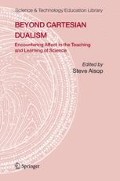Access this chapter
Tax calculation will be finalised at checkout
Purchases are for personal use only
Preview
Unable to display preview. Download preview PDF.
References
Alsop, S., & Watts, M. (2000). Facts and feelings: Exploring the affective domain in the learning of physics. Physics Education, 35(2), 132–138.
Association for Science Education. (2002). Can we; should we? On ASE Science Year Resources. Bringing Science Year into the Classroom. CD-Rom. Hatfield: Association for Science Education.
Block, N. J., & Dworkin, G. (1977). The I.Q. controversy: Critical readings. London: Quartet Books.
Bloom, B. S., Krathwohl, D. R., & Masia, B. B. (1964). Taxonomy of educational objecitves. The classification of educational goals. Handbook II: Affective domain. London: Longman.
Cooper, R., & Sawaf, A. (1997). Executive EQ: Emotional intelligence in business. London: Orion Business Books.
Gardner, H. (1983). Frames of mind: The theory of multiple intelligences. New York: Basic Books.
Goleman, D. (1996). Emotional intelligence. Why it can matter more than IQ. London: Bloomsbury.
Greenhalgh, P. (1994). Emotional growth and learning. London: Routledge.
Head, J. (1985). The personal response to science. Cambridge: Cambridge University Press.
Kutnick, P., & Rogers, C. (Eds.). (1994). Groups in schools. London: Cassell.
Levinson, R., & Reiss, M. (Eds.). (2003). Key issues in bioethics: A guide for teachers. London: Taylor & Francis.
Matthews, B. (2001). Emotional literacy in secondary schools: Enabling pupils to develop in subject lessons. Retrieved 2002, (accessed April 2002), from http://www.nelig.com/articles/ised.htm
Matthews, B. (2003). Improving science and emotional development (The ISED project). Emotional Literacy, citizenship, science and equity (2nd ed.). London: Goldsmiths.
Matthews, B. (2005). Engaging Education. Developing Emotional Literacy, Equity and Co-education. Buckingham: McGraw-Hill/Open University Press.
Matthews, B., & Sweeney, J. (1997). Collaboration in the science classroom to tackle racism and sexism. Multi-cultural Teaching, 15(3), 33–36.
Salovey, P., & Sluyter, D. (Eds.). (1997). Emotional development and emotional intelligence. Educational implications. New York: Basic Books.
Sharp, P. (2001). Nurturing emotional literacy. London: David Fulton.
Singh, B. (2001). Dialogue across cultural and ethnic differences. Educational Studies, 27(3), 343–355.
Steiner, C. (1997). Achieving emotional literacy. London: Bloomsbury.
References
Boler, M. (1999). Feeling power: Emotions and education. New York: Routledge.
Mathews, B. (2004). Promoting emotional literacy: Equity and interest in science lessons for 11–14 year olds; the ‘Improving Science and Emotional Development’ project. International Journal of Science Education, 26(3), 281–301.
Author information
Authors and Affiliations
Editor information
Editors and Affiliations
Rights and permissions
Copyright information
© 2005 Springer
About this chapter
Cite this chapter
Matthews, B. (2005). Emotional Development, Science and Co-Education. In: Cobern, W.W., et al. Beyond Cartesian Dualism. Science & Technology Education Library, vol 29. Springer, Dordrecht. https://doi.org/10.1007/1-4020-3808-9_14
Download citation
DOI: https://doi.org/10.1007/1-4020-3808-9_14
Publisher Name: Springer, Dordrecht
Print ISBN: 978-1-4020-3807-5
Online ISBN: 978-1-4020-3808-2
eBook Packages: Humanities, Social Sciences and LawEducation (R0)

